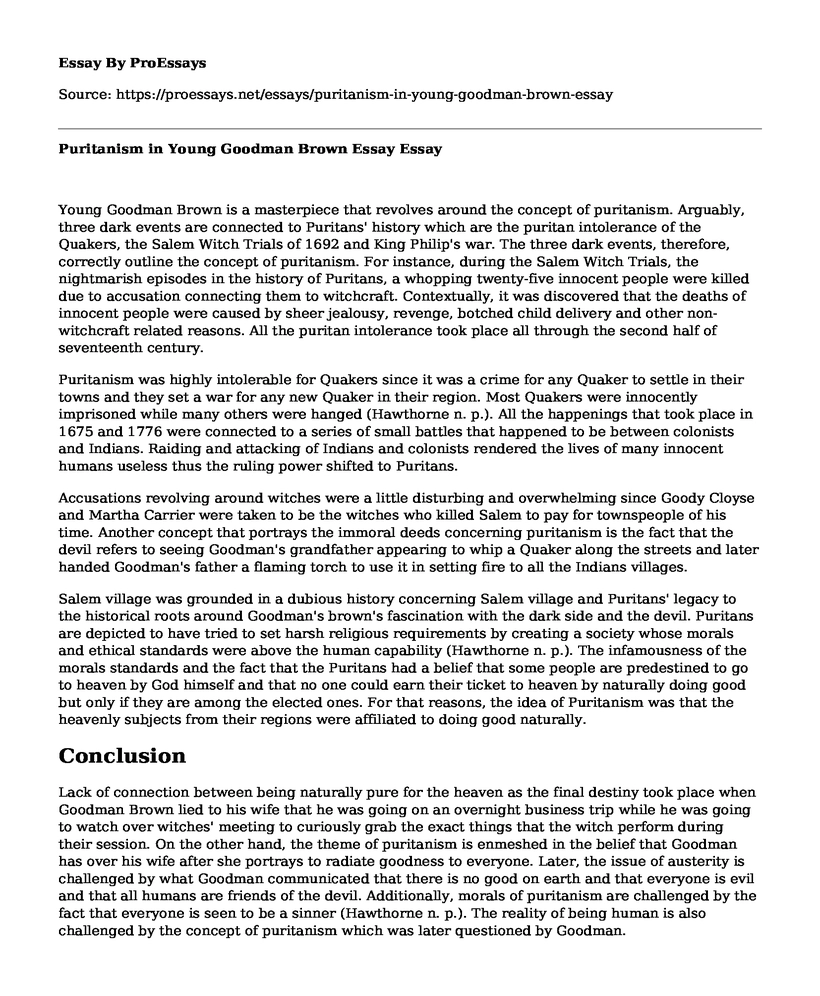Young Goodman Brown is a masterpiece that revolves around the concept of puritanism. Arguably, three dark events are connected to Puritans' history which are the puritan intolerance of the Quakers, the Salem Witch Trials of 1692 and King Philip's war. The three dark events, therefore, correctly outline the concept of puritanism. For instance, during the Salem Witch Trials, the nightmarish episodes in the history of Puritans, a whopping twenty-five innocent people were killed due to accusation connecting them to witchcraft. Contextually, it was discovered that the deaths of innocent people were caused by sheer jealousy, revenge, botched child delivery and other non-witchcraft related reasons. All the puritan intolerance took place all through the second half of seventeenth century.
Puritanism was highly intolerable for Quakers since it was a crime for any Quaker to settle in their towns and they set a war for any new Quaker in their region. Most Quakers were innocently imprisoned while many others were hanged (Hawthorne n. p.). All the happenings that took place in 1675 and 1776 were connected to a series of small battles that happened to be between colonists and Indians. Raiding and attacking of Indians and colonists rendered the lives of many innocent humans useless thus the ruling power shifted to Puritans.
Accusations revolving around witches were a little disturbing and overwhelming since Goody Cloyse and Martha Carrier were taken to be the witches who killed Salem to pay for townspeople of his time. Another concept that portrays the immoral deeds concerning puritanism is the fact that the devil refers to seeing Goodman's grandfather appearing to whip a Quaker along the streets and later handed Goodman's father a flaming torch to use it in setting fire to all the Indians villages.
Salem village was grounded in a dubious history concerning Salem village and Puritans' legacy to the historical roots around Goodman's brown's fascination with the dark side and the devil. Puritans are depicted to have tried to set harsh religious requirements by creating a society whose morals and ethical standards were above the human capability (Hawthorne n. p.). The infamousness of the morals standards and the fact that the Puritans had a belief that some people are predestined to go to heaven by God himself and that no one could earn their ticket to heaven by naturally doing good but only if they are among the elected ones. For that reasons, the idea of Puritanism was that the heavenly subjects from their regions were affiliated to doing good naturally.
Conclusion
Lack of connection between being naturally pure for the heaven as the final destiny took place when Goodman Brown lied to his wife that he was going on an overnight business trip while he was going to watch over witches' meeting to curiously grab the exact things that the witch perform during their session. On the other hand, the theme of puritanism is enmeshed in the belief that Goodman has over his wife after she portrays to radiate goodness to everyone. Later, the issue of austerity is challenged by what Goodman communicated that there is no good on earth and that everyone is evil and that all humans are friends of the devil. Additionally, morals of puritanism are challenged by the fact that everyone is seen to be a sinner (Hawthorne n. p.). The reality of being human is also challenged by the concept of puritanism which was later questioned by Goodman.
Work Cited
Hawthorne, Nathaniel. Young Goodman Brown. Booklassic, 2015.
Cite this page
Puritanism in Young Goodman Brown Essay. (2022, May 17). Retrieved from https://proessays.net/essays/puritanism-in-young-goodman-brown-essay
If you are the original author of this essay and no longer wish to have it published on the ProEssays website, please click below to request its removal:
- Symbols in "Hills Like White Elephants" by Ernest Hemingway
- Essay on Why Odysseus Described as One Who Veered From His Path
- Suffering in King Lear by Shakespeare Essay Example
- Essay Sample on Montresor's Revenge: A Well-Executed Plan Achieved 50 Years Later
- Essay Sample on Brooklyn Bridge Inspires Poetry: Mayakovsky & Hart Crane
- Book Review Sample on Rappaccini's Daughter: Complete Spectrum of Human Morality
- Essay Sample on Psychoanalytic Literary Theory







